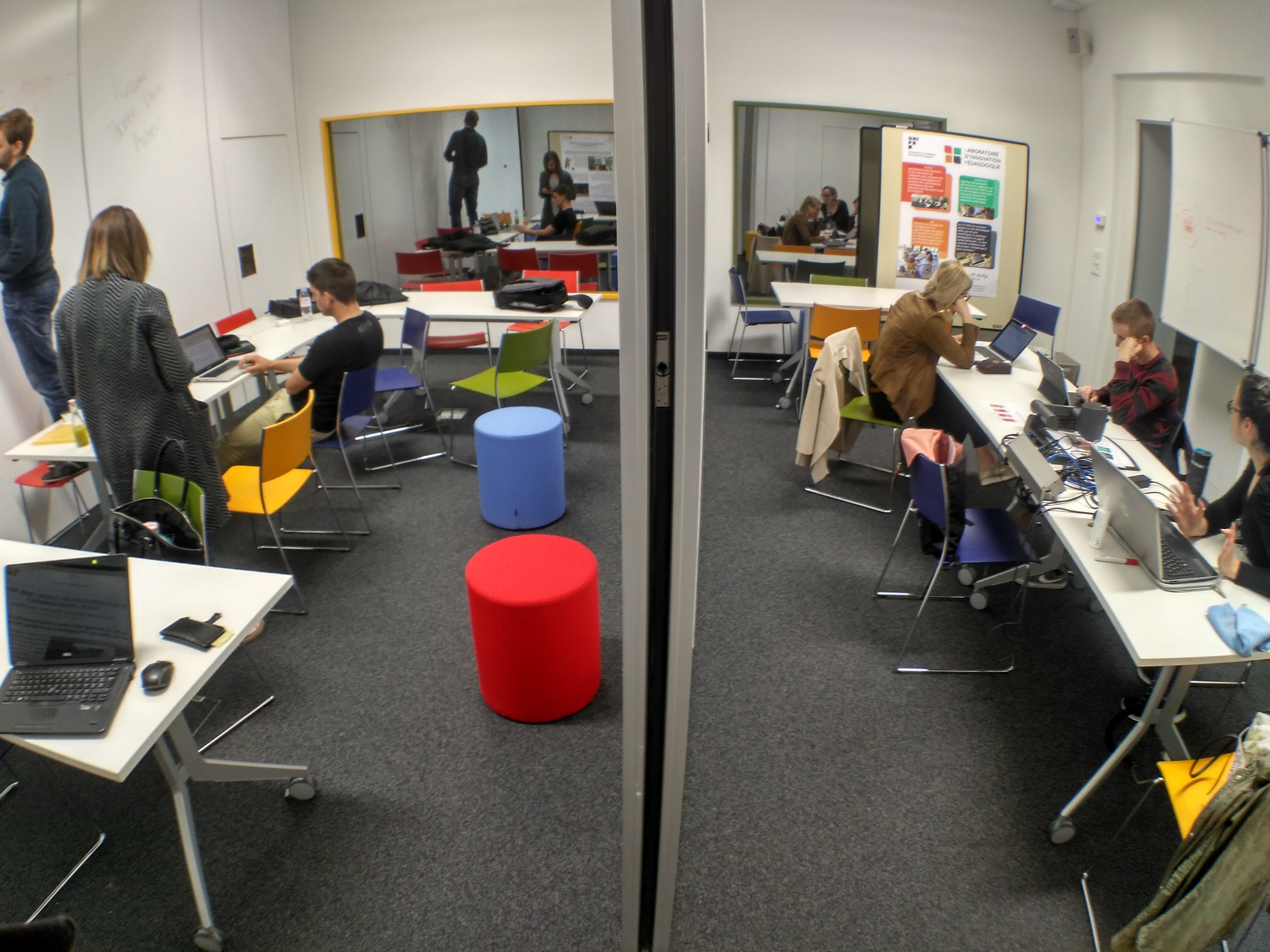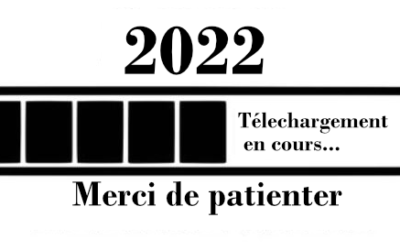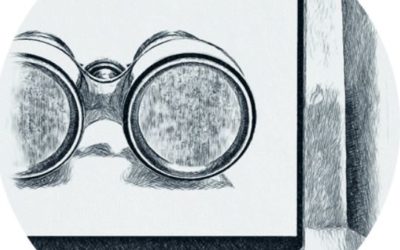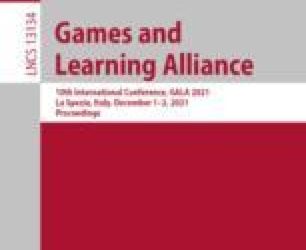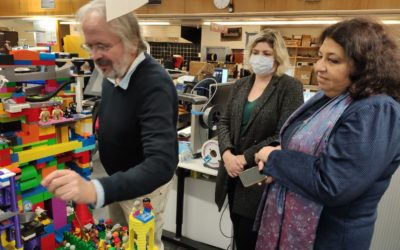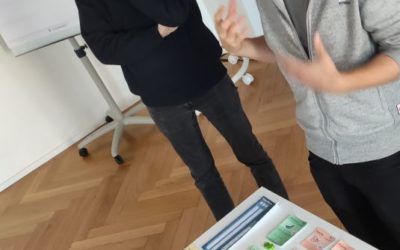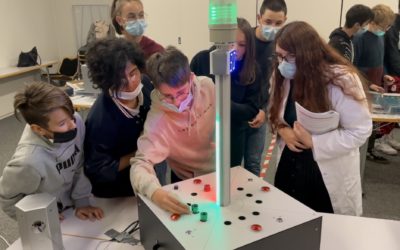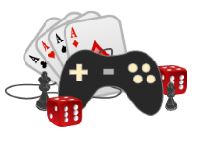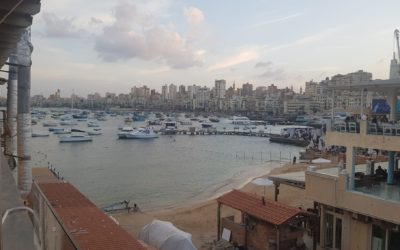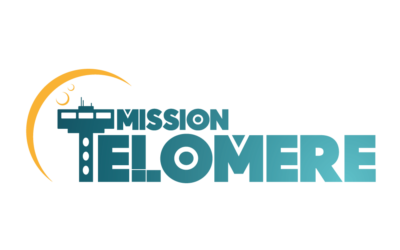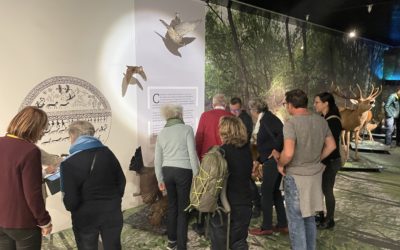co.LAB – A Digital Lab for the co-Design, co-Development and co-Evaluation of Digital Learning Games
Interest in Digital Learning Games (DLGs) has flourished at all levels of education. Digital Learning Games contribute to increasing students’ motivation and engagement, and are effective tools to support learner centered teaching practices. However, the design, development and uses of DLGs remain an issue due to the gap between teachers, game developers and researchers.
At the crossroads between educational and computer sciences the goal of the co.LAB project is to improve the design, development and uses of Digital Learning Games at all educational levels in Switzerland. This goal will be achieved by the development of what we call the co.LAB: a collaborative methodological framework between teachers, game developers and researchers in educational science, associated with a collaborative digital platform dedicated to co-design, co-development and co-evaluation of DLGs.
With the development, implementation and assessment of the co.LAB methodology and digital platform, we want to answer the following research questions (RQ).
RQ1: What methodology is needed to support collaborative DLG design and development?
RQ 2: What are the digital platform features necessary to support the collaborative DLG design and development process?
RQ 3: What are the effects of the methodology and digital platform on development cost and duration (efficiency)?
RQ 4: What are the effects of the methodology and digital platform on the quality of DLGs produced (relevance and effectiveness)?
RQ 5: What are the drivers for adoption of the methodology and digital platform by the educational, game developer, and research communities?
Following a design-based and mixed methodology, the co.LAB methodology and digital platform will be implemented and tested with the design, development and evaluation in real educational contexts of two showcase games dedicated to medical education (higher education) and computational thinking (secondary education). They will be used as a proof of concept. The experimentations will be carried out with classes both in a secondary school and at a university of applied sciences. The data collected will be based on an ethnographic approach on the one hand (questionnaires and focus groups carried out with stakeholders), and on the digital traces of users of the platform on the other hand.
By including a digital infrastructure for digital learning resources development and by providing, as a use test result, two digital learning games the project is fully in line with the PNR77 goals and more specifically with the module “Education, learning and digital change”. In addition, the co.LAB methodology, digital infrastructure and laboratory may serve both as an example of the introduction of digital in education and as a basis for future co-development of open digital educational resources in general.
Durée du projet
01/2020 – 12/2023
Financement
Fonds National Suisse

Requérants principaux
Dominique Jaccard HEIG-VD et Eric Sanchez, Université de Fribourg
Partenariat
Haute Ecole d’Ingénierie et de Gestion du Canton de Vaud
Membres du projet
Estelle Prior Unige
Mariem Jaouadi Unige
Membres associés
Nadine Mandran LIG/U. Grenoble
Matthieu Vermeulen IMT Nord Europe
Emmanuel Beffara U. Grenoble
Gaëlle Guigon IMT Nord Europe
Jérémie Humeau IMT Nord Europe
Anthony Fleury IMT Nord Europe
Contact
Eric Sanchez (eric.sanchez@unifr.ch)
Dernières actualités relatives à cette recherche
Rétrospective 2021
L'année 2021 se termine et le Laboratoire d'Innovation Pédagogique vous propose cette petite rétrospective sur les travaux qui ont été menés.1 déménagement Au premier février 2021 l'équipe a rejoint l'unité TECFA à l'Université de Genève, soit, en termes de personnel,...
Interview pour PRISME sur l’enseignement à distance
Mieux réfléchir à ce que l’on met en ligne... Dans cet entretien avec François Othenin-Girard pour la revue pédagogique PRISME, Eric Sanchez revient sur les conséquences de la pandémie sur les apprentissage et les travaux du réseau LETS Learning Lab sur l'innovation...
A Digital Companion to Assist the Game Master for the Orchestration of a Mixed-Reality Game
ouvelle publication du LIP sur la question de la collecte de traces multimodales destinées au maître du jeu. Les travaux ont été menés dans le cadre des projet DigitComp et PLAY au Musée de la Nature à Sion (projets financés par le FNS). Abstract: The control of the...
4ème séminaire du projet LETS Learning Lab
Le séminaire de clôture du projet LETS Learning Lab qui regroupe des membres des universités de Beyrouth, Alexandrie, Sousse et Genève s'est tenu cette semaine. Les travaux qui ont été mené ont permis de finaliser le cahier des charges d'un learning lab qui sera...
Premier test d’un jeu à l’Alimentarium
Le projet PLAY se poursuit avec de nouvelles expérimentations du jeu Geome programmées au Musée de la Nature en 2022 et la conception d'un nouveau jeu pour l'Alimentarium à Vevey. Le travail qui est mené est le fruit d'une collaboration de l'Alimentarium, de Digital...
Revue de Presse de Mission Télomère
Vendredi 12 novembre 2021, Mission Télomère, l'escape game de prévention à la santé était présenté à la Presse romande. Voilà les différents articles et reportages produits à la suite de cette journée. Prévention du tabagisme : un Escape Game pour convaincre les...
Conception collaborative d’un jeu d’évasion pédagogique dans le cadre d’une game jam : du design du jeu au design du jouer
Une nouvelle publication du LIP dans la revue Science du Jeu Résumé : Cet article aborde la question de la conception collaborative de jeux dédiés à un usage éducatif à partir de l’analyse d’une game jam qui a permis de concevoir Mission Télomère, un jeu d’évasion...
Troisième séminaire du projet LETS Learning Lab à Alexandrie
Après plus d'une année de travail en ligne, les membres du projet LETS Learning Lab se sont retrouvés à Alexandrie, en Egypte, pour quatre jours de séminaire. Outre une journée dédiée à un atelier de design thinking auquel ont participé une quarantaine de membres de...
Mission Télomère en Conférence de Presse
Ce vendredi 12 septembre 2021 au Cycle d’orientation de la Glâne (Fribourg) Mission Télomère sera présenté à la presse romande, en présence de conseillers d’état fribourgeois Anne-Claude Demierre (DSAS) et Jean-Pierre Siggen (DICS). L’occasion pour Veronique Pittet...
#SYM.PLAY, ses experts en muséographie testent le jeu Geome
Jeudi 4 novembre 2021 s’est tenue au musée de la Nature à Sion (Valais Suisse) la conférence « SYMBIoSE | LIAISONS VITALES » à laquelle l’équipe du projet PLAY a participé. La conférence, qui s’est déroulée les 4 et 5 novembre 2021,...

